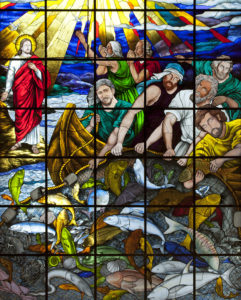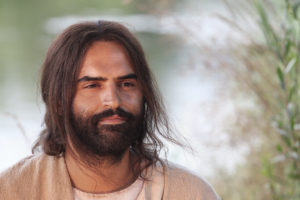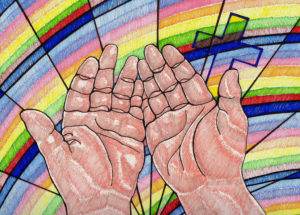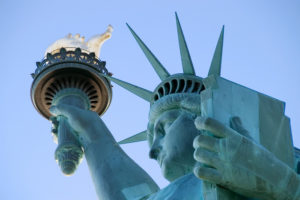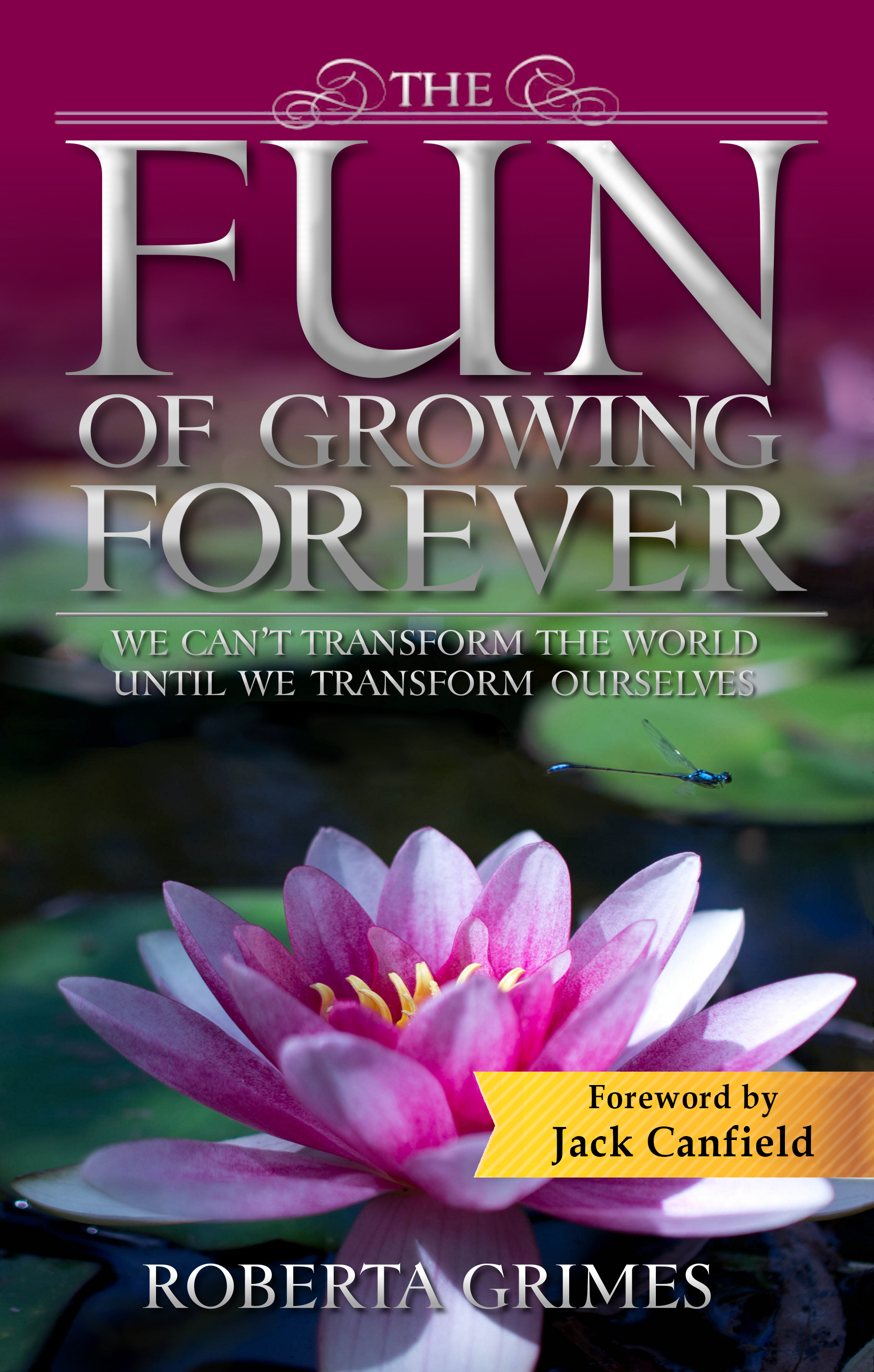In a sense we’ve come to our nation’s capital to cash a check.
When the architects of our Republic wrote the magnificent words
of the Constitution and the Declaration of Independence,
they were signing a promissory note to which every American
was to fall heir. This note was a promise that all men –
black men as well as white men –
would be guaranteed the unalienable rights of
life, liberty and the pursuit of happiness.
– Dr. Martin Luther King, Jr. (1929-1968) from “I Have a Dream…” (1963)
 Dr. Martin Luther King, Jr. was the greatest American of the twentieth century. The more time passes since Dr. King’s death, the higher his stature has come to rise; and watching that happen within the memory of people who recall him as a living crusader feels the way it must have felt when the United States began to revere as its Founding Fathers all those contentious Revolution-era politicians. I was in college when Dr. King was assassinated. I had come to love the man, so waking up to find that he had been killed was the biggest devastation of my young life. But when later that morning I used the word “assassinated” in reference to Dr. King, I was confronted by an outraged Southern classmate. She shouted that he had been just a criminal and not a public figure at all so he didn’t deserve that honored term. I learned on the morning after Dr. King’s death the extent of the evil under which he had lived.
Dr. Martin Luther King, Jr. was the greatest American of the twentieth century. The more time passes since Dr. King’s death, the higher his stature has come to rise; and watching that happen within the memory of people who recall him as a living crusader feels the way it must have felt when the United States began to revere as its Founding Fathers all those contentious Revolution-era politicians. I was in college when Dr. King was assassinated. I had come to love the man, so waking up to find that he had been killed was the biggest devastation of my young life. But when later that morning I used the word “assassinated” in reference to Dr. King, I was confronted by an outraged Southern classmate. She shouted that he had been just a criminal and not a public figure at all so he didn’t deserve that honored term. I learned on the morning after Dr. King’s death the extent of the evil under which he had lived.
And now the descendants of slavery among us confront another potential evil that may be almost as harmful to them as has been the frank racism I glimpsed that day. While clueless rioters rush to destroy even the revered statues of genuine heroes, they mostly ignore – and they even betray – the very people they claim to most want to help. Well-meaning people in academia, too, tell us now that we all must grovel and atone for the mess that America’s race relations have been, while apparently hardly giving a thought to the fact that all these problems have human causes and 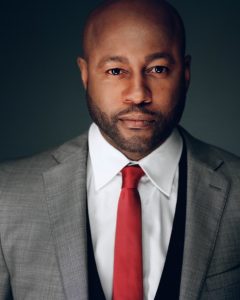 therefore they can be healed. For the first time in history, now we know for certain that there is one human race, which means that every apparent difference between people with varying shades of skin is the result of America’s prior mistakes. So in fact, all these renewed efforts to find and punish racism in our culture without attempting to altogether eliminate it can only be based on the false assumption that those with darker skin are in some ways deficient. To try to make Americans atone for racism rather than destroying the remnants of it is the tragic modern equivalent of my college classmate’s racist rage.
therefore they can be healed. For the first time in history, now we know for certain that there is one human race, which means that every apparent difference between people with varying shades of skin is the result of America’s prior mistakes. So in fact, all these renewed efforts to find and punish racism in our culture without attempting to altogether eliminate it can only be based on the false assumption that those with darker skin are in some ways deficient. To try to make Americans atone for racism rather than destroying the remnants of it is the tragic modern equivalent of my college classmate’s racist rage.
The progress toward full equality that Dr. King’s movement began in the Sixties had largely stalled before this century began. There are important reasons why this happened, and emphatically those reasons can be addressed! Indeed, for all of us to work together to make of this nation a truly colorblind society is what most modern descendants of slavery want. It is the least that they deserve, and it surely is what mercy demands! An entirely race-free future will be our ultimate triumph over all the horrors of slavery and racism that have so tragically soiled our past. It will give us at last our shining gateway to the free and equal nation that the wisdom of our Founders envisioned, and that Dr. King’s courage and strength began.
Last week we described six reasons for the racial inequality that still burdens the descendants of slavery in the United States. There may be other causes too, but to effectively address these six alone would make such a difference that it might well take us most of the way to that longed-for free and equal nation. This effort to establish in the United States a new era of racial equality can be advanced by using three initiatives. For various reasons they will need to be led not by governments, but rather by private foundations. And surely there can be no greater charitable goal than this effort to help the United States to fulfill at last its founding promises!
THE FULL EMANCIPATION FOUNDATION
We never can have real racial equality until we have fully emancipated the minds of a whole generation of slavery’s descendants. This should have happened a hundred and fifty years ago, but it is not too late. It can happen now. Every U.S. citizen born between, say, 2020 and 2040 with an ancestor who once was held here in slavery will be eligible to receive an extraordinary education from birth through graduate school. It will be important that we work closely with the parents and offer individual enrichment and empowerment during those crucial first five years of life. And our model for elementary and secondary schools might be the Success Academies which began in 2006 in Harlem and have grown to 45 charter schools with 17,000 students in the New York City area. There have been efforts by some to limit the use of charter schools by the economically disadvantaged, but the methods pioneered by the Success Academies have resulted in such extraordinary educational achievements for children who might otherwise have failed in public schools that for this project nothing less will do. Our goal will be to give to this first emancipated generation the same quality of educational and personal empowerment that they could have had if they had been born into America’s most successful families.
minds of a whole generation of slavery’s descendants. This should have happened a hundred and fifty years ago, but it is not too late. It can happen now. Every U.S. citizen born between, say, 2020 and 2040 with an ancestor who once was held here in slavery will be eligible to receive an extraordinary education from birth through graduate school. It will be important that we work closely with the parents and offer individual enrichment and empowerment during those crucial first five years of life. And our model for elementary and secondary schools might be the Success Academies which began in 2006 in Harlem and have grown to 45 charter schools with 17,000 students in the New York City area. There have been efforts by some to limit the use of charter schools by the economically disadvantaged, but the methods pioneered by the Success Academies have resulted in such extraordinary educational achievements for children who might otherwise have failed in public schools that for this project nothing less will do. Our goal will be to give to this first emancipated generation the same quality of educational and personal empowerment that they could have had if they had been born into America’s most successful families.
Fully emancipating one generation of slavery’s modern descendants can all by itself entirely re-set race relations in the United States. These children will be our much-loved new beginning, with each of them nurtured and adored by every American of good will. If we do for them what we should have done for their freshly freed ancestors, we can now and for all future time eradicate the ill effects of our having so 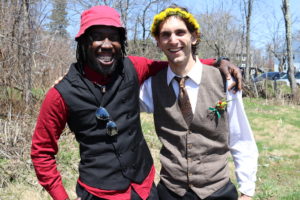 badly bungled the first century and a half after slavery was abolished, including the Black Codes, Jim Crow, and the War on Poverty’s destruction of the black family. We can in one stroke effectively address five of the six errors that we listed last week! And importantly, in doing this we will be creating a powerful new image for all black Americans. Today, if you walk down a street and see a group of young black men ahead, your first reaction is likely to be to assume they are a gang of toughs. Perhaps you even might cross the street. But twenty years from now, you will be walking down that same street and see a group of young black men ahead, and you will assume they must be college students. Very soon in the United States the appearance of having African ancestry will become a certain marker for elevated status and greater success.
badly bungled the first century and a half after slavery was abolished, including the Black Codes, Jim Crow, and the War on Poverty’s destruction of the black family. We can in one stroke effectively address five of the six errors that we listed last week! And importantly, in doing this we will be creating a powerful new image for all black Americans. Today, if you walk down a street and see a group of young black men ahead, your first reaction is likely to be to assume they are a gang of toughs. Perhaps you even might cross the street. But twenty years from now, you will be walking down that same street and see a group of young black men ahead, and you will assume they must be college students. Very soon in the United States the appearance of having African ancestry will become a certain marker for elevated status and greater success.
THE LIVING TOGETHER FOUNDATION
While we are beginning our better long-term future by at last emancipating a full generation of slavery’s youngest descendants, there is a lot that we can do to improve the lives of these children’s family members. This second initiative will ideally be led by those who best understand the communities being served, and Americans who want to be part of the solution are going to find a lot to do! Three-quarters of black children today are born to single mothers, many of whom can benefit from assistance and mentoring; and older children may well need some tutoring and tuition help. With a third of black men now cycling into and out of prison, we can seek and find ways to help people wronged by that system to build some success and satisfaction into their later lives. And in everything we do we must never forget, not even for a moment, that every modern descendant of slavery is precisely who we are ourselves. There will be no limit to what they can do, once we give them the gift of a better beginning.
and Americans who want to be part of the solution are going to find a lot to do! Three-quarters of black children today are born to single mothers, many of whom can benefit from assistance and mentoring; and older children may well need some tutoring and tuition help. With a third of black men now cycling into and out of prison, we can seek and find ways to help people wronged by that system to build some success and satisfaction into their later lives. And in everything we do we must never forget, not even for a moment, that every modern descendant of slavery is precisely who we are ourselves. There will be no limit to what they can do, once we give them the gift of a better beginning.
THE GENUINE JUSTICE FOUNDATION
No matter whatever else we might do, the only way for us to entirely heal America’s racial wounds will be with a complete reform of our horrendous criminal justice system. Next week we will commemorate the 244th birthday of the United States, so we will pause then for a celebration of what could have been and still might be. Then the following week we will devote some time to talking about how we can and why we must reinvent criminal justice in America if we are ever to make racial justice possible.
Dr. Martin Luther King, Jr., said, “We must learn to live together as brothers or perish together as fools.” We are seeing now how right he was! And the best way to honor this brilliant and selfless man who lived and died for righteousness will be for all of us to come together, every American of every shade, and build at last the better nation that its original Founding Fathers imagined and its twentieth-century Founding Father  has given us the vision to at last achieve. It is time for those of us who have inherited the world’s oldest constitutional republic to help it live up to its founding promises so it can at last become a beacon of freedom and hope for all the world.
has given us the vision to at last achieve. It is time for those of us who have inherited the world’s oldest constitutional republic to help it live up to its founding promises so it can at last become a beacon of freedom and hope for all the world.
I have a dream that one day this nation will rise up, live out the true meaning of its creed: “We hold these truths to be self-evident, that all men are created equal.
…
I have a dream that my four little children will one day live in a nation
where they will not be judged by the color of their skin but by the content
of their character. I have a dream… I have a dream that one day
in Alabama, with its vicious racists, with its governor having his lips dripping with the words of interposition and nullification,
one day right in Alabama little black boys and black girls
will he able to join hands with little white boys and white girls
as sisters and brothers.
– Dr. Martin Luther King, Jr. (1929-1968) from “I Have a Dream…” (1963)


















